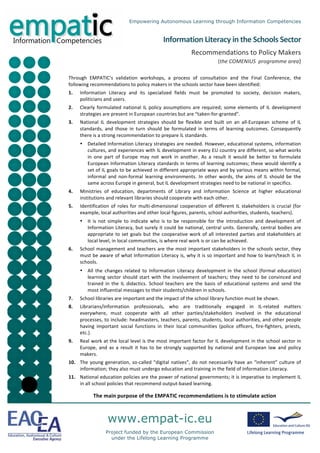
Recommendations - Schools: Final
- 1. Empowering Autonomous Learning through Information Competencies Information Literacy in the Schools Sector Recommendations to Policy Makers (the COMENIUS programme area) Through EMPATIC’s validation workshops, a process of consultation and the Final Conference, the following recommendations to policy makers in the schools sector have been identified: 1. Information Literacy and its specialized fields must be promoted to society, decision makers, politicians and users. 2. Clearly formulated national IL policy assumptions are required; some elements of IL development strategies are present in European countries but are “taken-‐for-‐granted”. 3. National IL development strategies should be flexible and built on an all-‐European scheme of IL standards, and those in turn should be formulated in terms of learning outcomes. Consequently there is a strong recommendation to prepare IL standards. • Detailed Information Literacy strategies are needed. However, educational systems, information cultures, and experiences with IL development in every EU country are different, so what works in one part of Europe may not work in another. As a result it would be better to formulate European Information Literacy standards in terms of learning outcomes; these would identify a set of IL goals to be achieved in different appropriate ways and by various means within formal, informal and non-‐formal learning environments. In other words, the aims of IL should be the same across Europe in general, but IL development strategies need to be national in specifics. 4. Ministries of education, departments of Library and Information Science at higher educational institutions and relevant libraries should cooperate with each other. 5. Identification of roles for multi-‐dimensional cooperation of different IL stakeholders is crucial (for example, local authorities and other local figures, parents, school authorities, students, teachers). • It is not simple to indicate who is to be responsible for the introduction and development of Information Literacy, but surely it could be national, central units. Generally, central bodies are appropriate to set goals but the cooperative work of all interested parties and stakeholders at local level, in local communities, is where real work is or can be achieved. 6. School management and teachers are the most important stakeholders in the schools sector, they must be aware of what Information Literacy is, why it is so important and how to learn/teach IL in schools. • All the changes related to Information Literacy development in the school (formal education) learning sector should start with the involvement of teachers; they need to be convinced and trained in the IL didactics. School teachers are the basis of educational systems and send the most influential messages to their students/children in schools. 7. School libraries are important and the impact of the school library function must be shown. 8. Librarians/information professionals, who are traditionally engaged in IL-‐related matters everywhere, must cooperate with all other parties/stakeholders involved in the educational processes, to include: headmasters, teachers, parents, students, local authorities, and other people having important social functions in their local communities (police officers, fire-‐fighters, priests, etc.). 9. Real work at the local level is the most important factor for IL development in the school sector in Europe, and as a result it has to be strongly supported by national and European law and policy makers. 10. The young generation, so-‐called “digital natives”, do not necessarily have an “inherent” culture of information; they also must undergo education and training in the field of Information Literacy. 11. National education policies are the power of national governments; it is imperative to implement IL in all school policies that recommend output-‐based learning. The main purpose of the EMPATIC recommendations is to stimulate action www.empat-ic.eu Project funded by the European Commission under the Lifelong Learning Programme
